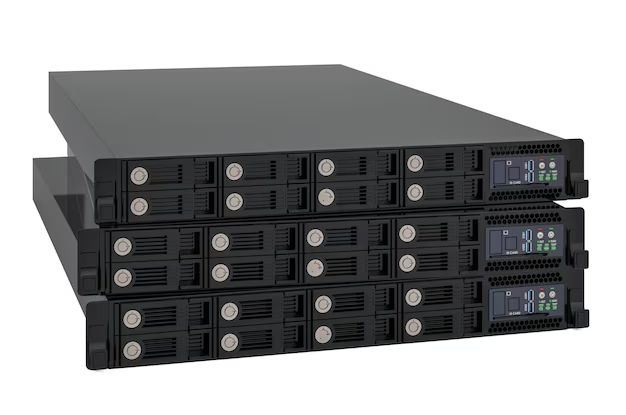Network-attached storage (NAS) is a storage device connected to a network that allows storage and retrieval of data from a centralized location for authorized network users and varied clients. NAS devices contain one or more hard drives that are arranged in logical, redundant storage containers or RAID arrays. The hard drives provide a robust data storage and protection mechanism for the information stored on the NAS.
What is QNAP?
QNAP Systems, Inc. is a Taiwanese corporation that specializes in network-attached storage (NAS) appliances used for file sharing, virtualization, storage management and surveillance applications. QNAP NAS devices run the QTS and QuTS hero operating systems that allow cross-platform file sharing and centralized management. QNAP offers a wide variety of NAS models to suit home and business needs with different drive bays, CPUs, memory capacity and connectivity options.
Key Features of QNAP NAS Devices
Some of the key features of QNAP NAS devices include:
- Multiple drive bays that support both 3.5″ and 2.5″ hard drives
- Intel, AMD or ARM processors for performance
- RAID data protection with single, JBOD, RAID 0, RAID 1, RAID 5, RAID 6 and RAID 10 support
- Gigabit Ethernet and 10GbE connectivity on higher-end models
- USB 3.0/3.1 Gen1 and Gen2 ports for additional storage expansion
- HDMI output for multimedia streaming
- Qtier auto-tiering and SSD caching for optimized performance
- Virtualization support for Docker containers, virtual machines and more
- Mobile apps for remote access and management on the go
Benefits of Using QNAP NAS
Some of the key benefits of using QNAP NAS devices include:
- Centralized storage – Store all data securely in one place and access it from anywhere on the network
- File sharing – Easily share files between users and client devices with SMB, AFP, NFS, FTP/SFTP protocols
- RAID data protection – Safeguard against drive failure and data loss with supported RAID types
- Snapshots – Quickly restore previous versions of files and folders
- Media streaming – Stream videos, music and photos to smart TVs and media players
- Virtualization – Run virtual machines and Docker containers for apps and services
- Remote access – Access stored files remotely from anywhere over the internet
- Scalability – Expand storage capacity by adding more drives as needed
- Backup – Automatically backup computers and devices to the NAS
QNAP Operating Systems
QNAP NAS devices run on either QTS or QuTS hero operating systems:
- QTS – QNAP NAS operating system with a browser-based interface, app center and wide app support. Ideal for file storage, backup, virtualization, media streaming etc.
- QuTS hero – ZFS-based NAS OS optimized for storage performance and efficiency. Supports advanced data protection, snapshots, dedupe and compression.
Both operating systems provide a great NAS experience. QuTS hero prioritizes storage performance and data integrity with ZFS while QTS offers more apps and broader hardware support.
QNAP NAS Management
QNAP NAS devices can be managed in several ways:
- Web Console – Browser-based admin dashboard for NAS configuration, apps, storage, users etc.
- QTS App Center – Install 100+ apps for added functionality – Plex, Surveillance, WordPress, Virtualization tools etc.
- Mobile Apps – Qfile, Qmanager, Qmusic etc. allow NAS access and management from mobile devices.
- QFinder Pro – Desktop utility to search, access, manage, transfer files on NAS.
- myQNAPcloud -Allows remote NAS access over the internet through the myQNAPcloud service.
- Qcommander – Streams System Admin and Device Management Power in one centralized platform for multi-NAS management.
QNAP NAS Use Cases
QNAP NAS devices are highly versatile and can be used in several ways:
- Personal file storage – Store all your photos, videos, music and documents in one place for anywhere access.
- Media library – Stream videos, music and photos to all your devices using Plex, Emby, Kodi etc.
- Backup – Protect PCs, laptops, smartphones by backing up to the NAS.
- Shared storage – Centrally store and share files for family, friends and small teams.
- Surveillance – Connect security cameras to the NAS and run the Surveillance Station app.
- Virtualization – Run Virtual Machines and Docker apps in a NAS Virtualization Station.
- Private cloud – Access NAS storage remotely like a cloud service.
- Productivity apps – Use NAS apps like WordPress, Joomla, Drupal for web serving, CMS etc.
- Business storage – Share files, automate backup, improve productivity for businesses.
QNAP NAS devices are highly flexible for personal and business storage needs.
Conclusion
QNAP NAS devices provide robust networked storage that lets you centrally store, backup, share, sync, stream and manage your data securely. The flexible QTS and QuTS hero operating systems enable a wide range of NAS applications for homes and businesses. Overall, QNAP offers reliable, high-performance NAS solutions suitable for personal and enterprise use.

